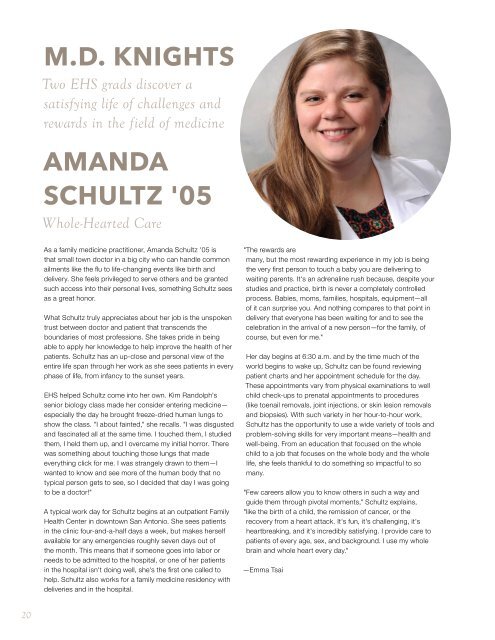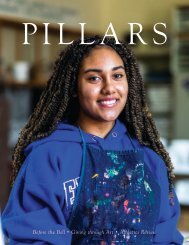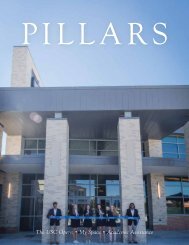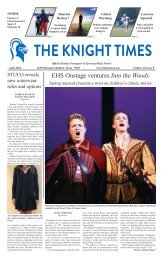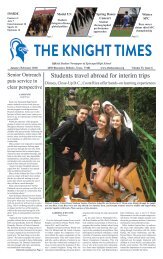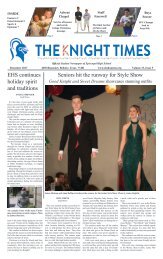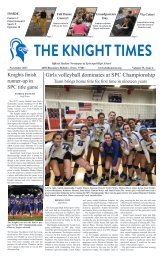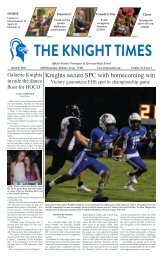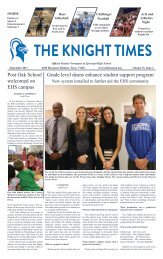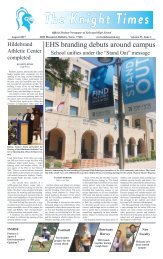EHS Pillars - Fall 2017
PILLARS - The Episcopal High School Magazine www.ehshouston.org
PILLARS - The Episcopal High School Magazine www.ehshouston.org
Create successful ePaper yourself
Turn your PDF publications into a flip-book with our unique Google optimized e-Paper software.
M.D. KNIGHTS<br />
Two <strong>EHS</strong> grads discover a<br />
satisfying life of challenges and<br />
rewards in the field of medicine<br />
AMANDA<br />
SCHULTZ '05<br />
Whole‐Hearted Care<br />
As a family medicine practitioner, Amanda Schultz '05 is<br />
that small town doctor in a big city who can handle common<br />
ailments like the flu to life‐changing events like birth and<br />
delivery. She feels privileged to serve others and be granted<br />
such access into their personal lives, something Schultz sees<br />
as a great honor.<br />
What Schultz truly appreciates about her job is the unspoken<br />
trust between doctor and patient that transcends the<br />
boundaries of most professions. She takes pride in being<br />
able to apply her knowledge to help improve the health of her<br />
patients. Schultz has an up‐close and personal view of the<br />
entire life span through her work as she sees patients in every<br />
phase of life, from infancy to the sunset years.<br />
<strong>EHS</strong> helped Schultz come into her own. Kim Randolph's<br />
senior biology class made her consider entering medicine—<br />
especially the day he brought freeze‐dried human lungs to<br />
show the class. "I about fainted," she recalls. "I was disgusted<br />
and fascinated all at the same time. I touched them, I studied<br />
them, I held them up, and I overcame my initial horror. There<br />
was something about touching those lungs that made<br />
everything click for me. I was strangely drawn to them—I<br />
wanted to know and see more of the human body that no<br />
typical person gets to see, so I decided that day I was going<br />
to be a doctor!"<br />
A typical work day for Schultz begins at an outpatient Family<br />
Health Center in downtown San Antonio. She sees patients<br />
in the clinic four‐and‐a‐half days a week, but makes herself<br />
available for any emergencies roughly seven days out of<br />
the month. This means that if someone goes into labor or<br />
needs to be admitted to the hospital, or one of her patients<br />
in the hospital isn't doing well, she's the first one called to<br />
help. Schultz also works for a family medicine residency with<br />
deliveries and in the hospital.<br />
"The rewards are<br />
many, but the most rewarding experience in my job is being<br />
the very first person to touch a baby you are delivering to<br />
waiting parents. It's an adrenaline rush because, despite your<br />
studies and practice, birth is never a completely controlled<br />
process. Babies, moms, families, hospitals, equipment—all<br />
of it can surprise you. And nothing compares to that point in<br />
delivery that everyone has been waiting for and to see the<br />
celebration in the arrival of a new person—for the family, of<br />
course, but even for me."<br />
Her day begins at 6:30 a.m. and by the time much of the<br />
world begins to wake up, Schultz can be found reviewing<br />
patient charts and her appointment schedule for the day.<br />
These appointments vary from physical examinations to well<br />
child check‐ups to prenatal appointments to procedures<br />
(like toenail removals, joint injections, or skin lesion removals<br />
and biopsies). With such variety in her hour‐to‐hour work,<br />
Schultz has the opportunity to use a wide variety of tools and<br />
problem‐solving skills for very important means—health and<br />
well-being. From an education that focused on the whole<br />
child to a job that focuses on the whole body and the whole<br />
life, she feels thankful to do something so impactful to so<br />
many.<br />
"Few careers allow you to know others in such a way and<br />
guide them through pivotal moments," Schultz explains,<br />
"like the birth of a child, the remission of cancer, or the<br />
recovery from a heart attack. It's fun, it's challenging, it's<br />
heartbreaking, and it's incredibly satisfying. I provide care to<br />
patients of every age, sex, and background. I use my whole<br />
brain and whole heart every day."<br />
—Emma Tsai<br />
20


